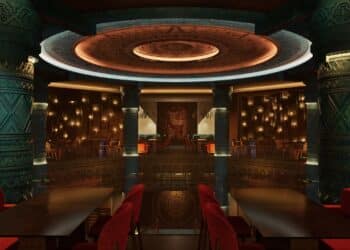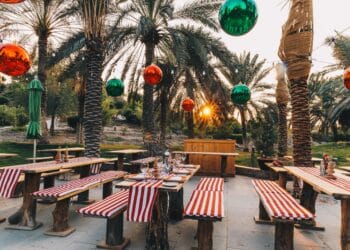Richemont Masterbaker Centre for Excellence in Baking and Pastry opened its doors in March with the objective of elevating the skill level of chefs specialising in pastry, bakery and chocolate in the Middle East. Catering News paid a visit to find out more.

While Masterbaker Marketing was established in the UAE in 1992 to supply bakery and pastry ingredients to the foodservice industry in the UAE, Oman, Qatar and the Maldives, the company has always been involved in educating chefs on pastry and bakery. Last year, Masterbaker took this a step further by teaming up with Richemont Centre of Excellence in Switzerland to develop a pastry and bakery school in Dubai’s Jumeirah Lakes Towers, where professional chefs can hone their skills and learn more about European methods.
Ronnie Khajotia, director, Richemont Masterbaker Centre for Excellence in Baking and Pastry tells Catering News: “In many parts of the world, you get good bakery and pastry education, but it’s not as evolved as in the West. It’s about bringing the level of chefs in this region to that of the Europeans.”
Previously, Masterbaker would send some 700 – 800 chefs to Europe to its partner’s schools in Germany, France, Switzerland and Holland to study but the courses were too product-focused, according to Khajotia, who was keen to establish an independent institution focused primarily on the technical aspects of bakery and pastry.
However, identifying a professional educational institution in Europe that would be willing to give its name to a school in Dubai – and not as a franchise agreement – wasn’t easy. It took Khajotia a year of negotiations to convince the institution to go ahead with the Dubai project – its first outside of Switzerland.
“Just giving a stamp doesn’t mean much. After speaking to some institutes, we were introduced through our Swiss chocolate manufacturer, Felchlin, to Richemont Centre of Excellence. When we started talking to them, they soon realised we weren’t just talking about using their name, but providing a proper education.”
Raising awareness of the school and recruiting the right tutors was handled by Masterbaker Marketing, which has 25 sales staff. The company owns the school 100%, however Khajotia is keen to highlight that it is an independent entity.
“It will stand on its own feet in terms of profitability and it will work with anyone, not just with the ingredients from Masterbaker,” says Khajotia. “It’s a proper educational centre, not just a centre to teach Masterbaker products.
In addition to the challenges with bringing the right institution on board, Masterbaker Marketing had to get a license from Dubai Multi Commodities Center Authority (DMCC) – the only Free Zone authority outside of Tecom that can provide licenses to educational institutions in Dubai. In addition, it had to secure certification from Knowledge and Human Development Authority (KHDA) for its courses.

“KHDA have never authorised such a thing in Dubai,” says Khajotia. “They have authorised a cooking school, but never something so specifically focused on baking and pastry and with such short courses. They wanted to ensure it’s worth certifying, but that’s good for us. They won’t do it unless they’re convinced of the educational quality.”
At Richemont Masterbaker Centre for Excellence in Baking and Pastry, courses are split into bakery, and chocolate and pastry, with entry-level, intermediate and advanced modules available. Each course is five days long, but this may be altered over time in line with students’ requirements. In addition, from September 2017 the institute is looking to offer weekend and evening courses to the public and will bring in celebrity chefs to offer special courses.
“We realised a working chef doesn’t have time to spend six weeks on a course, so we had to design the courses according to the conditions in the Gulf. I think five days off they can get, and I’m requesting hotels to donate those five days rather than cutting them from their leave because that person wants to learn and better himself or herself.
“It would be good to see if we could run longer courses for people coming out of hospitality schools – we’d really like to collaborate in some manner. The school in Switzerland does longer courses, but we’ve got to start somewhere.”
Each five-day course is priced at AED 5,500, however for chefs paying for themselves, there is an introductory offer AED 4,500 and in certain cases the payment can be collected over three months. The courses are very intense and hands-on but with guidance from a textbook, which explains each module in depth, says Khajotia.
“With everything they do they can refer to a page number and take that away so they have a permanent source of information and knowledge. Even masters see it and think ‘there’s a lot I don’t know’. It’s very intense, very detailed,” he comments.
Recruiting the right people and designing the institution in line with the original building in Switzerland were also key considerations for Masterbaker Marketing. With around 700 customers in the UAE, Qatar, Oman and Bahrain, the company relied on word-of-mouth to attract CVs from pastry trainers who had Dubai experience but had been through the European – and preferably Germanic – pastry and bakery education system.
“Being a good baker is one thing, but being able to transfer that knowledge as a teacher, while working with your hands is a different skill,” says Khajotia, adding that all the tutors were sent to the school in Switzerland for training. Each course will have a maximum of 16 students in a class with three staff to 16 students.

The most senior chef instructor appointment is chef Christiane Trilck, the academic head of pastry and chocolate. Trilck, who trained in Culinary at the RBZ University in Germany for three years as a Masterchef was previously a key pastry trainer for Hilton Hotels, Waldorf and Conrad Hotels across the Arabian Peninsula.
Other staff members on board are Uwe Maienschein, assistant chef instructor of the bread & baking programme, who worked as a bakery chef in Germany for 27 years; Bhupendra Singh, assistant to chef instructor of the pastry & chocolate programme – he spent seven years in pastry operations in five-star hotels, including Palazzo Versace, Dubai; and Honorine Reach, assistant chef instructor of the pastry, & chocolate programme, who has 10 years of pastry experience in Michelin-starred restaurants in France and five-star hotels.
To ensure the design of the premises reflected that of the original school in Switzerland, architecture company Dimx was brought on board to create the layout as per Richemont’s standards, and to carry out the engineering work.
“The layout was according to Richemont’s requirements – the number of ovens and mixers, where to put what. The design was according to Richemont, so they have been involved very intensely. The designers have been to the facilities in Switzerland and have spoken to their architects,” Khajotia explains.
Equipment was brought in from a range of suppliers, with Miwe ovens, croissant machines from Rondo, knives from Victorinox, tables from Ginox Swiss Kitchen, Coldline fridges and cold stores from TSSC.

“They’ve all given us school pricing,” explains Khajotia. “Pricing to schools is different because it gets a lot of eyeballs directly from professionals and it’s their way of helping out because it’s all very expensive.”
Richemont Masterbaker Centre for Excellence in Baking and Pastry opened its doors last month and held its first class on 26 March. Currently Khajotia and the team are working on raising awareness of the facility and developing a wider range of courses. “We’re just getting started and seeing how the response is and what we can do next,” says Khajotia.
“I think it’s good for the skill level in the industry to go up. It’s good for everyone; certainly, it’s good for Masterbaker. All of the senior chefs are very happy that something like this is happening here; we’re putting big money into it!”
Interview: Chef Christiane Trilck

The academic head, pastry and chocolate explains more about the specifics of the courses being offered at Richemont Masterbaker Centre for Excellence in Baking and Pastry
How did you become a pastry trainer?
I developed a passion for training. At Hilton I did one-week courses and it gives you so much back to see how people are growing. I went on to open Palazzo Versace in Dubai but once I met with Ronnie and found out he wanted to open a school, I thought – ‘that’s it’. I’ve been working on the project for over a year now. I want to explain to the students that if you have someone that gives you the skills and the passion, you have endless opportunities. When I was a commis and worked with Hyatt I never thought I’d end up in Dubai as a teacher but I was fortunate enough to get so much knowledge from the people I’ve worked with along the way, and now I’m able to give it back.
Which ingredients do you use for the courses?
I try to use the best on the market. Dubai has a huge variety – you have many suppliers and I’m not just here to use Masterbaker ingredients, I can choose ingredients from wherever I want. Through my experience over the past 22 years, I know the ingredients I prefer to work with and this is what I’m doing in the school. It will be a lot of ingredients from Europe as well – German flour, cream and butter from France, etc.
How will the courses evolve?
We’re starting with these courses but we’re also in the process of developing more. Over the next couple of months, we will develop courses where we only focus on chocolate or gluten-free desserts or whatever the market requires. We also have the possibility that if you come with a certain amount of people we’ll just develop something for you, so we’re very flexible in terms of teaching. My team and I have been in the region a while now so we sit and brainstorm about our experiences and what we feel we need to develop, where we’ve struggled when we’ve worked in hotels, where there was a lack of knowledge. We are also looking at developing a bigger variety of courses – not just five days but maybe two days on a specific theme. I also see it as a supporting tool. Our previous students can come here and ask questions about suppliers, ingredients, techniques.
What are the barriers to learning for pastry chefs in the Middle East?
I think the challenge in the day-to-day running of a hotel is that you’re very under pressure as a pastry chef. The manning is always just the minimum amount, so people don’t really have time to say, ‘ok let’s stop for an hour and I’ll explain to you why you do certain things’. They learn how to make a pastry cream but nobody explains why you’re doing it and people don’t ask.
What is unique about the training offered at Richemont Masterbaker?
We give them the tools and the skills so they understand the ingredients, recipes and create their own and become independent. You can come up with your own ideas and become very creative and I think this is something you don’t get from a normal course or a book. You learn all the technical things and the basic pastry things and on top of that we give you a skill – becoming independent – and I think this is the main thing you take out of this course that will help you in your future career.
Is there a lack of pastry chef talent in the Middle East?
You can’t blame the people for a lack of talent. I’ve worked with people from Nepal who had never worked in a kitchen before and had no clue about pastry, but they were open-minded and keen to learn and this is key. These people were able to develop while working with me because they had the talent and the interest. They can take your comments on board and develop their skills to become brilliant. I think in the UAE we have a lot of talent, but unfortunately, we don’t have enough management willing to spend time and money on their development. Not enough is done for the staff.


































































